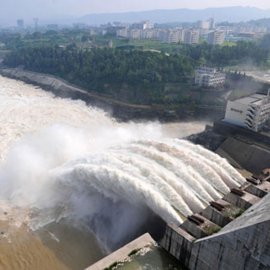Chinese Water Management
-
English
-
ListenPause
I’m Peter Neill, Director of the World Ocean Observatory. Like the United States, India, and other nations, the guarantee and distribution of fresh water to meet the needs of population growth, industrial agriculture, and changing climatological circumstance has relied on massive, centrally-planned water schemes – combinations of dams, reservoirs, pipelines, and canals – to accumulate water in areas where it is plentiful and move it to where it is not. The Tennessee Valley Authority and the California Water Project in the United States are primary examples. And yet, even these have not been able to meet 21st century demand, and projects for future needs indicate critical geographical imbalance and inevitable inequality. Add to this, the impact of climate change – drought, fire, and extreme weather – and as the citizens of California are discovering today, such schemes are woefully inadequate. China, as the newest and most rapidly developing population and industrial state, is no exception. In 2013, China opened the first phase of a massive engineering initiative designed to redistribute supply from water-rich area of the upper Yangtze River to the drought-parched plain surrounding Beijing, in response to a need seen as a threat to production, health, and political stability. The second phase, recently opened, added 793 miles connecting Danjiankou Dam in central China to the capital, at a total cost estimated in excess of $49 billion dollars. This need is the result of many familiar causes: industrial and agricultural pollution, massive population relocation from rural farms to manufacturing centers and cities, additional requirement for human consumption, sewage disposal, and treatment -- all resulting in an exponentially increased demand that has poisoned or exhausted local aquifers, lakes, and rivers, and entire watershed systems. Inherent in such an enormous effort are cost overruns, corruption, political disaffection, and external consequences that are not completely factored into the public financial accounting. For example, as China looks to covert its energy reliance on coal-fired generation, a shift to natural gas, increasingly available through hydraulic fracturing, becomes problematic as that technology is intensely reliant on huge quantities of locally available water that cannot also be diverted or eliminated from alternative use as result of the polluting aspect of that process. It is a vicious circle of geographical imbalance, excess demand, inadequate supply, and indifference to new ideas. What, you ask, are those new ideas? We have discussed them on World Ocean Radio before: the first is pricing, and the second is desalination. China is not the only nation in the world that makes water available without pricing its consumption on the true equation of supply and demand. Central planners look mostly to the big numbers, the volume of water that drives the economic return of manufacturing and big water intensive agricultural crops like wheat and corn. And so national water policy determines behaviors that abandon and destroy the small scale historical methods like conservation, local collection, drip irrigation, gray water recycling, and small hydropower generation that, ironically, other nations are looking to as new solutions to a comparable problem. Regardless of an ability to dictate the movement of populations, engineer enormous construction schemes with no concern for environmental or social consequence, and otherwise move conventional ideas and big numbers around, nothing will incite civic concern and unrest more than the lack of water and unbreathable air. Ultimately, it will come down to the ocean as the only place to turn for water for irrigation, hygiene, and the additional fresh water demand for human supply – three absolute requirements for self-sufficiency at every level. If you have no realistic or equitable pricing system for the available water on land, then you will certainly have no accurate pricing for the alternative. The desalination of ocean water for these uses is the final option, and yet, in China, as in most other places on earth, the existing technology is ignored or rejected on grounds of cost benefit analysis based on the false premise of the true value of water. If you accept that water is the most valuable commodity on earth, then there is no financial argument against its production at whatever cost. Hopefully, the world, regardless of national aspiration, political ideology, and systems of governance, will come to that conclusion in time to assuage our thirst for survival. We will discuss these issues, and more, in future editions of World Ocean Radio.
The distribution of fresh water to meet growth and increased demand has historically relied on massive planning structures. The impacts of climate change (drought, fire, extreme weather) are testing these structures, exposing them to be largely inadequate for a 21st century world. In this episode of World Ocean Radio, host Peter Neill will use China as an example of a rapidly-developing country in need of an industrial water policy that realistically factors the true cost of the supply and demand of water without sacrificing the small-scale historical methods such as conservation, water recycling, and small hydro. And he will caution that large scale construction schemes that develop with no concern for environmental and social consequence will incite civic concern and unrest.
About World Ocean Radio: Peter Neill, Director of the World Ocean Observatory and host of World Ocean Radio, provides coverage of a broad spectrum of ocean issues from science and education to advocacy and exemplary projects. World Ocean Radio, a project of the World Ocean Observatory, is a weekly series of five-minute audio essays available for syndicated use at no cost by college and community radio stations worldwide.
World Ocean Radio Has Gone Global: A selection of episodes is now available in Portuguese, Spanish, French, and Swahili. For more information, visit http://www.worldoceanobservatory.org/world-ocean-radio-global.
Image: Danjiangkou Reservoir, middle section of the south-north water transfer project in Wuhan, Central China's Hubei province.
Credit: Xinhua
- Login to post comments



